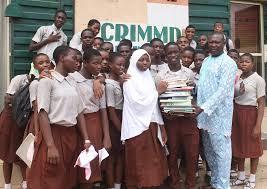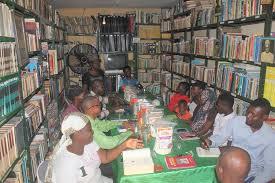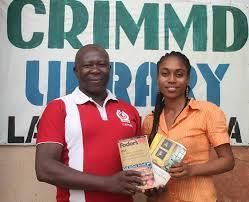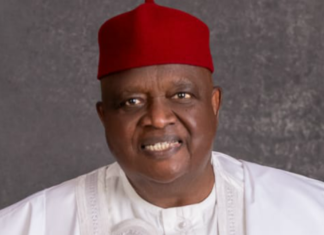By Emeka Alex Duru
For the contemporary Nigerian youth, addiction to the social media and electronic gadgets is almost the norm and bad enough, increasingly, a measure of ‘arrival’. The days of the youths and students boasting of the number of text books they had read within a specific period, are clearly over. The system is also not helping matters. In the absence of public libraries and the ever rising cost of essentials, including books, even the desirous youths and adults, do not find it easy, laying hands on books and other publications. The result has been the falling standard in education that is gradually attaining an embarrassing stage.
But like the biblical lone voice in the wilderness, the Center for Research, Information Management and Media Development (CRIMMD) a non-political, non-governmental, non-profit making standard research developmental institution, located in Lagos, is making a huge difference.

CRIMMD was formed by a collection of information intellectuals with great interest in media research and documentation.
As an intellectual developmental institution, CRIMMD reaches out to the public through participations in seminars, workshops, publications, conferences, excursions, humanitarian services, courtesy visit and awards presentation to deserving Nigerians.
Situated on Number 138 Ejigbo-Idimu road, Alimosho Council of Lagos State, the Centre boasts of a Library that has come to be seen as a strong legacy for the communities of Ejigbo, Isolo, Okota and Ikotun and its environs. Findings by TheNiche, indicated that on account of the huge number of patrons that throng the library every day, it is in a way, playing great role in helping to keep the youths active and away from playing the axiomatic devil’s workshop. This, it was gathered, has gone a long way in reducing the rate of crime in the vicinity. In its place, robust and productive minds are springing up. This particular feat, our correspondent learnt, accounted for why the CRIMMD Library was honoured by Ejigbo Police Community Relations Committee (PCRC), with a Merit Award for its contribution to the maintenance of security in the area. The facilitator of the Centre, Dr. Raphael James, explains his engagement in the project on the passion to sustain and spread knowledge.

“What is sustaining and motivating me to continue with what we are doing, is the passion I have for knowledge. Running the Centre has not been easy. We have challenges of accommodation and other logistics. We have the rents to pay and other bills to pick. We are non-profit making and non-political. We depend on the goodwill of the members of the public and organisations. On account of the biting economic situation, it has been quite challenging running the Centre. On occasions, the temptations had been strong to dump the project. But we are determined to stay the course. And we are gladdened by the visible impacts we are making on the public”, he told our reporter.
True to the commitment of James and his team, the center is living up to its agenda of reliving history and sustaining knowledge. Aside the free Library services it offers to the public, CRIMMD has visited and donated books to 33 Media Organizations in Nigeria, as its contribution to boost the reading culture in Nigeria.
Aside the Library, CRIMMD has a Photo Museum which it established on October 1, 2012. The Museum presently houses about 10, 000 photos on Nigerian history. Among these are photographs and portraits of the slave trade and its relics, the Berlin Conference of 1884/85 that provided the spade work for the scramble for and partition of Africa; the era of Explorers (Expedition) of Dr. Mungo Park, Richard Landers and others. There are also pictures of the merchants of the Royal Niger Company, cutting across George Goldie through to Lord Fredrick Lugard who amalgamated Nigeria in 1914, as well as his wife, a former colonial secretary of great Britain, Flora Shaw, who was said to have coined the name, Nigeria.
Outstanding landmark personalities abound. These include King Onyeama of Eke, King Jaja of Opopo, Queen Amina of Zaria, Bishop Ajayi Crowther; Protectorate governors and all former Governors-General; fire brand nationalist from Herbert Macaulay, Nnamdi Azikiwe, Obafemi Awolowo, Ahmadu Bello through to Mazi Mbonu Ojike; indigenous Governor General; Regional Premiers and Regional Governors; Military Heads of State and their Deputies; Military governors and the Military Administrators that ever ruled in the making and shaping of Nigeria. Contemporary Nigerian political leaders are also celebrated ion the Museum.
There is a section on “The 12-hour revolution of Isaac Boro” – the primogenitor of the Niger Delta activism; “The June 12 Saga” The Second World War; The Nigerian Civil War; Biafran Republic, including emblems like stamps, currency, coat of arm and many others – relics of historical significance.
Old currencies – notes and coins – dating to the period, prior to the establishment of the West African Currency Board: samples of used various forms of money including cowries and manilas and other strange commodities that were used as forms of exchange or barter, are also on parade in the Museum. National symbols – past and present, including different maps of Nigeria displaying state creations from the protectorate era to the present 36-state arrangement, old and new national anthems and the composers, amalgamation speeches and all coup speeches, symbols of coat of arms, flags and the personalities behind them, are equally covered in the Centre. There is also the book section, hosting great biographies of Nigerians, Nigeria history books, Military books, Civil war books and others.
For journalists and media practitioners, CRIMMD is a huge reservoir of the history and activities of the forebears of the industry. It for instance, houses the first Newspaper in Nigeria – the Iwe Irohin, published by an Anglican Missionary, Reverend Henry Townsend on November 23, 1859, in Abeokuta (Ogun State). The aim, according to Townsend, was “to get the people to read and to beget the habit of seeking information by reading”. Though the Paper did not last long, it provided the needed insight for subsequent publications in the country.
The Center also has the first edition of The Comet Newspapers (1934) and the West African Pilot (1937), published by Azikiwe, First Republic President. It also has the first edition of the Nigerian Tribune (1949), published by Obafemi Awolowo, Leader of the opposition in the First Republic. The editorial comments and opinions of these newspapers, fired the agitation by nationalists for the country’s independence.
Hosting and attending to patrons to the Centre, is what excites Dr. James, mostly. He is also excited by the response of the youths and researchers to the opportunities created by the Centre for their academic development and attainment. “Each day I look around and see streams of visitors to the Centre, I am gladdened that the message of sustaining knowledge is resonating”, James enthused.
How does he sustain the Centre, financially, our reporter asked James. This is where the challenge comes in. CRIMMD is a non-political, non-profit organization. It relies on the goodwill of public spirited individuals and groups. With the current financial crunch in the country, running the Centre has been quite tasking for the facilitator. Dr. Ime John, a gender activist and human capital development advocate, commends the good work of the Centre and calls on public and private concerns in the country to look into the salutary work it is doing and give it the necessary support. “It is not only the Reality Shows that we should support. We should also look into the activities of such institutions and initiatives that contribute intrinsically to human capital development in the country. From what I have heard about the Centre, efforts should be made to ensure that the good dream it has, does not die. We should support the facilitator and his team financially and morally to continue with the project”, she stated. Other commentators gave kudos to the Centre.











